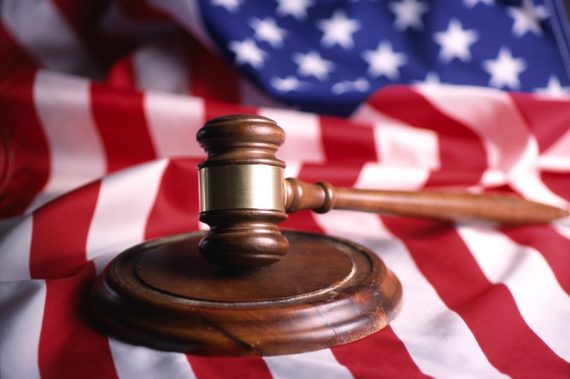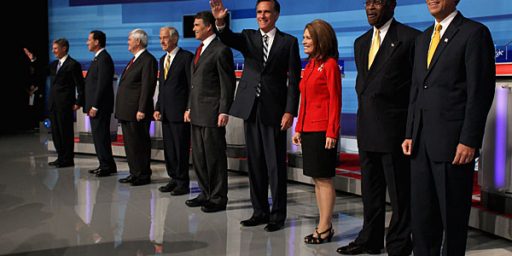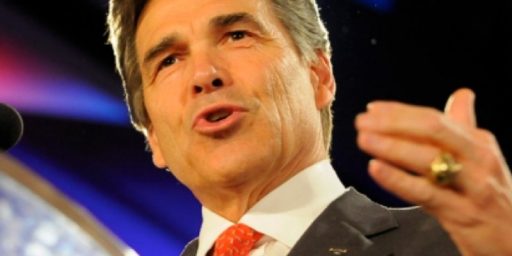Virginia Responds To Perry Appeal On Ballot Access Ruling
The Commonwealth of Virginia has already filed its response to the Emergency Motion filed by Rick Perry’s campaign early yesterday morning in the Fourth Circuit Court of Appeals:
Following Rick Perry’s appeal in his Virginia ballot access case this morning, officials in the state filed a response urging the U.S. Court of Appeals to uphold district judge John Gibney’s ruling.
Gibney, on Friday, said Perry and the other GOP candidates involved in the suit had waited too long to challenge the Virginia ballot laws, and should have done so before they’d already missed the deadline. The opposition stands by that argument, saying Perry and the other candidates were affected by the laws as soon as they started collecting signatures and could have raised the issue then.
The document also states that Perry doesn’t have legal standing to challenge the law.
“Governor Perry is not being denied a place on the ballot because of the circulator residency/voter eligibility requirement,” the argument reads. “He is being denied a place on the ballot because he did not meet the constitutionally sound requirement of submitting 10,000 valid signatures by the constitutionally valid deadline.”
Newt Gingrich, too, filed an appeal in the Richmond-based 4th Circuit of the U.S. Court of Appeals this weekend. Both Perry and Gingrich failed to qualify for the ballot back in December, and they — along with Rick Santorum and Jon Huntsman — challenged the stringent Virginia ballot laws on Dec. 27. The only two candidates who filed the required number of signatures were Mitt Romney and Ron Paul.
In addition to refuting Perry’s arguments against Judge Gibney’s finding that his claim was barred by the doctrine of laches largely along the lines that I discussed yesterday, the Commonwealth also makes this point:
Governor Perry is not being denied a place on the ballot because of the circulator residency/voter eligibility requirement. He is being denied a place on the ballot because he did not meet the constitutionally sound requirement of submitting 10,000 valid signatures by the constitutionally valid deadline. This circumstance made his claim nonredressable at the time suit was filed.
The Commonwealth also raises a previously undisclosed, at least in public, fact about Perry’s signature gathering effort:
With respect to timing, Governor Perry’s campaign was permitted to “collect the requisite signatures for ballot access between July 1, 2011 and December 22, 2011.” (Id. at 10). Although Governor Perry declared for the presidency on August 13, 2011 and “filed his Statement of Candidacy with the Federal Election Commission on August 15, 2011,” he only “signed and affirmed . . . his Declaration of Candidacy for the Commonwealth of Virginia on October 13, 2011.” (Id. at 6). Governor Perry’s national campaign manager, Joe Allbaugh, testified that he joined the campaign October 23, 2011 and that thereafter the vendor was hired. This was necessarily less than two months before the petitions were due even though the Perry campaign “knew the rules in Virginia many months ago.” (Id. at 1). As the district court put it: “In essence, they played the game, lost, and then complained that the rules were unfair.” (Id. at 2).
And then there’s this interesting point about that vendor:
The conjectural nature of Governor Perry’s claim is emphasized by an odd circumstance. Governor Perry personally certified 11,911 signatures to the State Board of Elections on December 23, 2011 (Defendants’ Ex. 6) (App. A), despite now acknowledging that approximately 6,000 signatures were filed. (Case 3:11-cv-00856-JAG Doc. 73 at 6 n.4). According to his campaign manager, Governor Perry based his certification upon a claim of the vendor. The unexpected hospitalization of the vendor’s Virginia agent left the campaign unable to determine whether the other 5,911 signatures were in fact collected. Hence, it may be that the circulator limitations did not even conjecturally prevent the Perry campaign from collecting 10,000 signatures. It is entirely possible that the critical number of signatures were simply lost.
At the very least, this may explain the discrepency between the 11,911 signatures Perry’s campaign said they had submitted on December 22nd, and the 6000 they acknowledged submitting when the lawsuit was filed less than a week later. Of course, just as with the fraud alleged by the Gingrich campaign, if it is true that more than half of Perry’s signatures were lost due to vendor negligence, that isn’t a ground for Perry to get on the ballot. Ultimately the campaign is responsible for gathering the signatures, and ultimately they are responsible for policing the vendor.
In any event, we should get a ruling on the motion relatively soon given the fact that we’ve got a mailing deadline coming up on Saturday. Most likely, I’d expect something to come tomorrow although it is possible that the three judge panel assigned to the case may issue a written ruling today notwithstanding the fact that it is a Federal Holiday. My guess is Perry loses this one pretty handily.
Here’s the Commonwealth’s response:
Perry et al v. Judd et al Opposition To Motion For Injunction







Does the Response include this line?
The Washington Post is reporting that the State Board of Elections has asked the Office of the Attorney General to investigate Newt Gingrich’s fraud.
@Timothy Watson:
Yes I saw that report. Obviously if this signature gatherer forged signatures and defrauded the campaign there are potential criminal charges in play.
Does anyone really believe that Perry will still be in the race by the Virginia primary?
Even if fraud was involved Gingrich HIRED them. It’s his fraud to bear (eg: he didn’t have enough signatures).
and “Does anyone really believe that Perry will still be in the race by the Virginia primary?” No way
@DRW1960:
I agree. However, if signatures were forged by this circulator and he received money for it then he could potentially face any number of criminal charges, beginning with fraud by false pretenses.